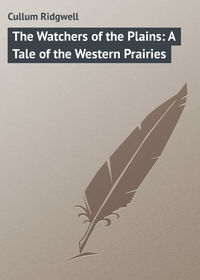 полная версия
полная версияThe Way of the Strong
He gazed into the boy's face as though he would compel him. Phyllis waited without a word.
Frank needed little consideration. His reply came promptly, and full of sincerity.
"I came to see if I could help her in any way." he said. "You're right. I should not have come for those other matters. Phyllis could have warned you. I am not here because of you. I am here because I – I helped to make that railroad strike, and I love my – I love Mrs. Hendrie. I said you could count on me for – anything, and I meant it. I'd willingly sacrifice everything, even my life, for Monica."
Hendrie suddenly released his hold upon the arms of his chair and sat back. His eyes were smiling, and, just for a moment, a wave of great peace swept over his stormy heart.
"I'm glad, boy," he said simply. "Monica is lying upstairs surrounded by everything the world can give her but the help which alone can save her life. You owe her much, but you owe her nothing compared with my debts to her. Now she is in need of the payment of every outstanding debt, and it is up to us. How can we bring Professor Hinkling from Winnipeg? That is the question that is now filling my heart and brain. When we have solved it, when that help is brought to her, then some of our debts will have been paid. How? How? How can this be done? How can this man Leyburn be bested. How?"
The man's words came hotly. He was not asking his questions of the others. He was simply reiterating the straining thought in his mind. Phyllis understood this, but Frank accepted the question as addressed to himself. His mind was not subtle. His simplicity at times was almost child-like. His prompt answer had something of that nature in it now.
"Why, the railroad is the only way," he said.
Hendrie threw up his hands in an ecstasy of irritation.
"The strike, man! The strike!" he cried. "There's not a passenger can travel. If it were attempted the permanent way would be torn up by Leyburn's orders. The railroad company would never risk the attempt."
Frank's eyes opened wide.
"Well?" he cried. "That's all right, If he can order the track torn up, he can order a train through – or order the strikers to let a train through."
The millionaire's eyes were fixed on the other's ingenuous face. He was exasperated at what he considered his display of almost imbecile childishness.
"But I tell you he would do anything to hurt or ruin me," he cried, rapidly losing all patience.
The sight of his evident impatience had a marked effect upon Frank. Phyllis, watching both men, saw her lover's eyes suddenly harden. His rather large mouth, so like the millionaire's, suddenly shut tight, and the movement was accompanied by a fierce setting of the jaws. A wave of anxiety for what was coming swept over her. Then came Frank's voice, as fierce and harsh as ever she had heard in Alexander Hendrie.
"If this man Hinkling's coming means saving Mrs. Hendrie's life, and Leyburn has power to let him through in time, and refuses it, I'll kill him, Mr. Hendrie," he cried, in a deep, stern voice. "I'll choke the rotten life out of him with these two hands," he added, in a sudden frenzy, reaching out toward the other with his fists clenching, as though they were grasping the labor leader's throat.
Hendrie's eyes lit as he heard the other's words and saw the murderously inspired action. The man meant it. He recognized the fierce spirit which underlay a nature of kindliness and gentle feeling, and, curiously enough, it warmed him, as the gentler side of the man had left him untouched.
He was about to reply when quite suddenly Phyllis cried out.
"I see. I see," she said. "Frank's right, Mr. Hendrie. Leyburn has the power, and, if he will not use it, he must be made to – "
But before she could proceed further the door was unceremoniously flung open, and Angus Moraine, lean, vulture-like, hurried in.
"It's no good, Mr. – Oh, beg pardon. I didn't just know – " He paused, as though about to withdraw at the sight of Frank and Phyllis. "Guess I'll come along later," he said. "There's a fire way out to the west. I saw it as I came along. Looks like the prairie. I'll just get around. You won't need the automobile. It'll take me quicker."
Phyllis started.
"Fire?" she demanded, in sudden alarm.
"Out west?" cried Frank, rising abruptly from his seat.
Angus nodded.
"Why, yes," he said. "Guess it's just the prairie."
Suddenly the millionaire laughed aloud.
"Prairie?" he cried. "Say, Angus, my boy, that's my crop. They've fired the crop. They're going to break me. Austin Leyburn and his scallywags. They're going to smash me by burning my crop, and then they're going to shoot down every nigger on the place while they let my wife die in her bed for want of a surgeon's aid. Do you get that all? Do you? That's Leyburn. Austin Leyburn, who came here days ago and promised he'd smash me for things done way back on the old Yukon trail. Hey! Stop right here and listen. I've got it now, and this boy, here, and this child, too, have shown me the way. There's no train to go through, eh? That's what they've told you in Calford. A million dollars won't take one through. Well, a tram's going through, and for a deal less than a million. The railroaders need Leyburn's order. Leyburn's order!" He laughed in a wild sort of sarcasm. "Well, by God, he shall give it! This boy and girl are on. It don't need any telling. You are on, my dour Scot – I know you. We'll let him burn the crop, let him shoot up the niggers, I don't care a curse. He's going to send that train through. Sit right down and I'll tell you 'bout it."
CHAPTER XVII
A RAID
Austin Leyburn was well enough satisfied. More than that, he felt he had earned these moments of satisfaction.
He had taken a big chance in rushing down in his automobile from Calford to Everton at the moment when the newly started strike of the railroad required his whole attention, and the sympathies of other forms of transport required to be brought into line. So many things might go wrong with his greater plans, and though his working staff and fellow-leaders were men of capacity, and fully able to deal with affairs, he knew that, in all emergency, his was the organizing brain, his was the final word.
But the risk had been worth while. Anything was worth while that gave him opportunity of satisfying something of his almost lifelong hatred of Alexander Hendrie. This new toy of his, this organization of agricultural labor, had assumed proportions far greater in his mind than any of his other interests, and the reason of it lay in the fact that at last, after years of waiting, it had brought him into contact with the man, Leo. Better still, Leo, the Leo he had at last found out, was worth while. He was a great man, a man head and shoulders above all his fellows in the world's affairs, and his ultimate fall would be something worth while having brought about.
His delight was manifest as he rode along the trail in the direction of Everton. His good humor left his narrow eyes smiling his satisfied thought. His men had worked well; and he – well, he had never worked harder, or with a more satisfactory result. These men of the soil were far easier to influence than town-bred workers. It was natural – as they were. Yes, for once in his life he felt grateful to those who had served him. The men who had been sent ahead to agitate had never worked with such successful results. He would remember them, and mark them out for promotion.
Then there was young Frank Smith. He smiled more broadly down at his horse's ears. Leo's son – working for his father's downfall. It was a pretty touch, and the humor of it tickled him. Oh, Leo should know of it – later on, when the work was completed.
Frank. He wondered where he was just now. The smile died out of his eyes. He had purposely kept his meeting secret. He had had no desire that the boy should witness it. He had a perfect estimate of the youngster's prejudices and feelings which might have militated against his, Leyburn's, success had Frank listened to his urging of those drink-sodden creatures to violence. But where was he? He had received no word from the boy for nearly a week. He made a mental note to set inquiries afoot – that is, if no word were awaiting him on his return to Calford.
At that moment his horse, an old roadster, hired at the livery barn in Everton, threw up its head and snuffed at the light, southern breeze. Leyburn glanced up expectantly and turned his eyes in the direction in which his uneasy horse was staring. In an instant Frank was forgotten, and his whole attention became fixed upon what he beheld. He drew rein sharply, and the animal stood fidgeting and fretful.
Away to the southwest behind him a ruddy glow shone upon the night sky. It was the direction whence the night breeze sprang, and he knew that it was at the point where he had held his meeting. He rubbed his hands gleefully and chuckled. While he watched the glow spread along the southern horizon, and as it spread so the stars in the sky above were obscured, and he knew that a great fog of smoke had intervened to hide them.
His horse continued to fidget, and again and again its gushing nostrils strove to expel the taint of smoke, now plainly to be noticed in the fresh air of the plains.
But the man remained absorbed. Farther and farther along the horizon lit, and now, where before only a glowing reflection had been, a sharp belt of flame showed up, revealing to his satisfied eyes the great billows of smoke rolling along and upwards, borne upon the bosom of the summer breeze.
He knew that his work was complete. He knew that those whom he had left behind to see that his desires were carried out had done so promptly and satisfactorily. He knew that now no human hand could save the miles of crop belonging to Alexander Hendrie. He knew that, by morning, a charred, black debris would be all that remained of hundreds of thousands of dollars worth of grain, and that Leo, the great Leo, would be just so much the poorer.
He gave his restive horse its head, and the eager beast plunged forward down the trail. It was thankful, desperately thankful, for the chance of getting away from the hateful, fascinating sight.
Leyburn's eyes remained turned upon the wonderful spectacle of the fiercely burning grain. The fire was sweeping onward with a terrific rush, and a dull roar reached him as it licked up the rustling heads of wheat in a parallel to the road he was traveling. Its pace was miraculous, and man and beast were soon left far behind in the race. Never had this man witnessed such a wonderful scene, and something of its awe filled his heart.
He had no misgivings, no qualms of conscience. It was his work, this wanton destruction, and he gloried in it. The weight of his hand had fallen, and he knew that Alexander Hendrie, while powerless to help himself, would understand who had directed the blow.
The fire grew with lightning rapidity, and even here on this trail, well away from the danger zone, the heat left his horse in a lather of sweat. The smoke, too, was choking, but the discomfort of it was no discomfort to him at all, only to his horse, who had no desire for a cruel vengeance in its submissive heart.
He sped on rapidly. Soon the trail turned away northward, and the fire fell lower and lower upon the horizon, and the heated night air cooled and sweetened. But the man half regretted he was no longer in full view of the result of his mischief. Still he reveled in the thought of what Hendrie's feelings must be just now. It gave him the greatest delight to picture the millionaire standing in the shadow of his palatial home while a vast slice of his wealth was vanishing in smoke before his eyes.
An hour later he approached the bluffs which surrounded Everton. He had passed no one on the trail. As he drew near his destination he was still further astonished to find no sign of excitement stirring. He looked back. The sky was lit for miles around, yet Everton and its surroundings seemed all undisturbed. There was just a slight feeling of pique in him as he realized how little popular stir his doings had caused, and this lack of interest somehow lessened his satisfaction.
The bluff swallowed him up, and he dug his heels viciously into his horse's flanks.
The next moment he became aware of a horseman riding toward him. That was better. Everton was awake after all. Doubtless only the silence of the bluffs gave the little town its appearance of indifference to the epoch-making achievements of his genius.
The horseman rounded a bend in the trail just ahead of him. He drew up sharply as he came abreast.
"Say," the man cried, without ceremony, "guess you don't just happen to be Austin Leyburn?"
Leyburn thought quickly before replying.
"You looking for him?" he inquired evasively.
"What in hell do you s'pose I'm doin'?" retorted the other, with a sort of explosion.
"Shouting a deal," observed Leyburn calmly.
"Guess you'd shout too, if you was chased this time o' night rushin' around hunting a guy called Leyburn, when there's a hell of a big fire eatin' up that doggone skunk Hendrie's wheat."
"Fire?"
Leyburn appeared surprised.
"That's what I said. Say, you ain't deef an' blind, or what's ailing yer? You come along that way. Gee, I'd sure guess that lousy dollar king's 'bout hatin' hisself right now. It's his boys. They're on strike. More power to 'em, sez I. If I'd anything in their bizness I'd burn his house, too."
"You a farm hand?" inquired Leyburn amusedly.
"Was. I worked for Hendrie till his dirty Scotch manager fired me. Now I'm chasin' chores around the hotel, back there. Well, guess I got to find this guy 'fore I make my blankets this night. I'll get on – seein' you haven't seen him around."
But Leyburn promptly detained him.
"I'm your man," he said quietly. "What is it?"
"You're Leyburn?" The man's eyes twinkled in the darkness as he fumbled in his dirty waistcoat pocket. "I'm real glad," he exclaimed. "Guess I'll get a peek at Hendrie's bonfire after all. Here – it come over the 'phone for you an hour back. It's from Calford. The boss wrote it down so I wouldn't forget. You got to chase back to Calford right away. Something important. Boss said they wouldn't say wot, seein' it wasn't you speakin', but you wasn't to lose a minit – 'cep you wanted one hell of a bust-up of trouble. Here it is." He drew out a piece of paper tightly folded.
Leyburn took the paper.
"That what this paper says?" he asked.
"Wal, not just them words, but you got to get back right away. Guess I'll get on an' see that fire now."
The choreman picked up his reins and rammed his heels into his horse's flanks.
"So long," he called out, as his horse dashed forward in the direction Leyburn had come.
Leyburn did not trouble to reply. He was already urging his horse forward so as to reach the hotel with as little delay as possible.
Trouble in Calford. He had risked it by making his visit to Everton. It was always the way. He might have known. What fool trick had they been up to in his absence? Was there ever such a pack of imbeciles? Not one fit to be trusted for a second. He slashed his horse's sides with vicious heels in his haste to obey the summons.
The level prairie trail lay like a ribbon outstretched in front of the speeding machine, as the searchlight at the head of the car threw out its great shaft of hard, cold light.
The man at the wheel sat well forward. His eyes were straining behind his glasses, straining to discover in time those treacherous unevennesses so frequently found in the hollows of an unmade road. The speed was terrific, and even Austin Leyburn, who sat beside him, with all his confidence in his man, was sitting up, too, lending his watchful eyes to the task.
The machine purred musically in the stillness of the night. The engine was firing with perfect precision, and the occupants of the car were left free to give their whole attention to the surface of the road. It was needed, too. The danger of their speed in the darkness was great, even to the most experienced chauffeur.
Austin Leyburn had been forced to obey his summons. On arrival at the Russell Hotel he had interviewed Lionel K. Sharpe, and verified the telephone message. Sharpe had told him the same as he had written down on paper, and assured him of the urgency with which the message had been sent.
But even this had not been sufficient for the shrewd labor leader. Nothing would satisfy him but to ring up Calford himself. He was promptly afforded every facility. Nor was it until he had spent half an hour in vain ringing that he discovered that the machine had taken into its wayward, wooden head to get out of order. In consequence he was left with no alternative but to accept the message as it stood, and make the journey to Calford with all possible speed.
His mind traveled swiftly over the possibilities suggested by the message. But each and every suggestion that came to him left him dissatisfied. He could think of no probability that demanded his presence at headquarters before the morning, at his usual hour, the time his fellow-workers were aware he intended to return.
He became annoyed. The more he considered the matter the more his annoyance grew. Yet he could not help a feeling of uneasiness, too. All his satisfaction of a short while ago had passed. It was one thing to achieve a long-cherished revenge; but, to him, it was quite another if its achievement meant the upsetting of his entire life's work. These thoughts came to him and would not be denied, in spite of his repeated reassurance that it was all impossible, and that the message must have been the result of some absurd and sudden panic on the part of some blundering fool.
He was in the midst of these reflections, and his own attention was consequently distracted from the road, when a whistling sound escaped the man beside him. It was like a sharp intake of breath, caused by sudden alarm. Leyburn turned toward him, and as he did so the car jolted under the sharp application of brakes, while behind them a stream of sparks lit their wake.
"What is it?" he demanded, peering out ahead. "Gee!" he cried in alarm, an instant later. "Quick, skirt it!"
But the car jerked to a standstill in a manner that must nearly have ripped the tires off the wheels, and Leyburn found himself with his hands gripping the dashboard below the glass wind-screen, which came into sharp contact with his face.
"Gee! That was a narrow shave," cried the chauffeur, with a gasp of relief.
"What the devil – !" cried Leyburn, struggling back to his seat, while the engine roared free, vibrating the whole car violently, as if in angry protest.
But the driver had jumped to the ground, and stood contemplating a huge tangle of barbed wire spreading right across the trail, less than a dozen yards beyond the front wheels.
Leyburn climbed down and followed him. There were no bluffs, there were no fields with barbed wire fencing anywhere in sight. It was plain enough, even in the darkness, that they were surrounded on either hand by nothing but bare, open prairie. He approached the tangled mass, and his man pointed at it.
"We must clear it," he said. "It's these cursed farmers. They're so darned careless – Say, if we'd gone headlong into that, it would have torn our running gear right out. Look at that." He stooped and fingered the great strands of wire.
Leyburn bent down. His suspicions were fully aroused.
"Say," he cried. "This didn't get here by – "
"Hands up!"
The cry came sharply from directly behind the labor leader, and its threat was unmistakable.
Leyburn turned at the hoarse demand. The chauffeur stood up. Both found themselves looking into the muzzles of revolvers. Two masked men stood confronting them, while a third was waiting close by.
The chauffeur promptly complied with the order. He felt that he had nothing to gain by refusing. He remembered in time that he had only a few dollars in cash on him, and no valuables.
Leyburn was less quick to respond. Light had broken in upon his quick brain, and his thoughts had gone back to the telephone message.
Another sharp order brought his wandering attention back to the exigencies of the moment, and his hands were slowly raised above his head.
Then the third man became active. Without a moment's hesitation, and in absolute silence, he ran his hands down the labor leader's pockets. Then he produced a rope, and taking hold of his arms forced them to his sides, finally securing them behind his back. Once his man was completely trussed he turned his attention to the other, treating him to similar attentions.
The whole thing was the work of a few moments. Leyburn, impotently raging, was left quite helpless. So sudden and startling had been the attack, so unsuspected, that its success was complete; and even protest became impossible before the threat of his assailants' weapons.
Now more than ever he knew he had been trapped by the telephone message. But why, and by whom? Robbery? It was absurd. The money he had on him would not pay these men for their trouble and risk.
No, it was not robbery. Then he remembered Hendrie and the firing of his crop. In a moment he became anxious, and narrowly scrutinized the figures of his assailants. Two of them were large, and the third was a lean creature, tall enough, but small beside the other two. Each man's face was completely covered by a long black mask. He could not tell even if they were bearded.
His suspicions once aroused, however, he quickly made up his mind that this was the work of his arch-enemy, and he knew that, for the time, at least, he stood at his mercy.
Suddenly a hand was laid upon his shoulder. He was turned about. Then he was thrust forward.
"Walk," commanded the man who had first spoken. The next moment he found himself moving out on to the prairie.
In the meantime the chauffeur was hustled back to the automobile. His captor secured him in the front seat, while the third man dragged the barbed wire clear of the road. Then the other took his place at the wheel, and the car rolled away.
The third man looked after it. Then he finally turned off the trail and followed Leyburn and his captor. By the time he reached them, both men were in the saddle, waiting. Two other horses stood by. He sprang into the saddle of one and led the other, and the whole party set off across the prairie.
CHAPTER XVIII
HIS BACK TO THE WALL
"Phew!"
Hendrie threw off the long cloth mask he had been wearing. It dropped into the wastepaper basket beside the desk. Angus Moraine followed his example.
In the center of the room, sitting on a high-legged armchair, his arms still bound, Austin Leyburn silently watched his captors' movements.
They were in the library at Deep Willows.
Long before their arrival Leyburn had become aware of his captors' identity. The identity of the third man, who was no longer with them, puzzled him – was still puzzling him. The journey to Deep Willows had been made with the passing of scarcely a single word. Once the captive attempted to break the silence, but a swift threat had left him no alternative.
Leyburn was no physical coward. But he knew men; and his understanding of them left him convinced that Leo, as he preferred to think of him, was utterly reckless when goaded as he had been goaded by the total loss of his crop. Therefore he waited, watchful and alert, ready to fight the moment any reasonable opportunity offered, or to submit, according to circumstances.
The millionaire's manner had lost something of its severity. For the moment he felt he was back in the old fighting days when lawlessness had no terrors for his impulsive heart. It felt good to have his wits pitted against his old associate with all law and order thrust into the background. Besides, he knew that something far more precious than his own life was dependent upon the result of this night's work.
He switched on additional light and then moved over to the desk, against which he propped himself.
"Hot. Hot as hell, under those things, Tug, my boy," he said, while Angus unostentatiously seated himself in a chair somewhat behind the prisoner. "Still, I guess they were necessary. I wouldn't have had your man recognize us. You didn't matter. He did. You are only one. Say, he's a smart lad – your chauffeur. If he hadn't been you'd both likely have been on the way to glory now, traveling on a barbed wire. You were moving some. Still, I had to risk all that. I needed you out in the open, with no one around, and I hadn't time to worry out a better plan. You see, I wanted you – without any halo. Guess I'll have to hand your boy a wad – later. He did me a right good turn saving your neck."









